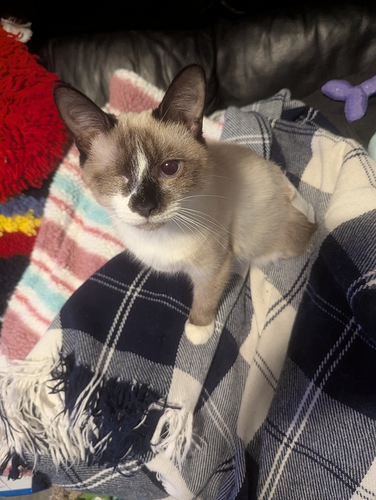My significant other and I own two cats - 8 year old spayed sisters. They are indoor only.
We are in the process of adopting a 6 month old kitten from a rescue (same rescue we got our current two from). The rescue has a policy of only accepting cats with negative FELV tests, however this one slipped through and was not tested before being picked up by the rescue. (The place from where she was pulled claimed she had been tested and was negative but was later unable to provide any proof of the test results).
Upon discovering the kitten had not been tested, the rescue ran an ELISA test for FELV, which was “faintly positive.” However, a follow-up PCR test was negative.
The rescue advised me of this - they believe that based on this result the ELISA result was either a false positive or an indication that she has a regressive infection. They are keeping the kitten for another 3 weeks to test again. They have also offered to pay for the initial vaccination of our two current cats with the new RNA FELV vaccine (my understanding is that this version is significantly safer than the older vaccines) if we adopt the kitten.
The kitten is not showing any indication of illness and has not since she was picked up. Any exposure would have almost certainly been before she was picked up by the rescue 5 weeks ago.
Based on the above, I am leaning towards:
- If further tests are negative…Adopt the kitten. Possibly get all three FELV vaccinated.
- If further tests point towards a regressive infection and she remains asymptomatic…adopt the kitten and get our current two vaccinated with the RNA vaccine, with the mindset that the kitten will be immediately isolated from our other two cats if she ever appears unwell.
3)If she has an active FELV+ infection - sadly, I think we have to back out of the adoption (I would still go through with it if she were to be an only cat, but I feel I have a duty to our other two cats to not expose them).
Our current two cats are not immunocompromised. All three cats would be indoor only. We are able to isolate cats temporarily in our home, but it would not be workable as a permanent solution (so no adopting a confirmed FELV+ and simply segregating her for life).
Does anyone have feedback on the above plan, or suggestions of other things I’m not considering? I am going to discuss this with my vet to get their take, but I value the input and experience of this group also.
I am assuming that the new RNA FELV+ vaccine, though safer than previous versions, is still not 100% effective in preventing infection.

 .
.

 I will say the last cat I lost to lymphoma always tested Felv negative (and was negative his entire life).
I will say the last cat I lost to lymphoma always tested Felv negative (and was negative his entire life).